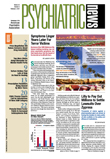The recent headlines about someone being discharged from the Army with a“ personality disorder” is a reminder that in 2002 the Washington Psychiatric Society and the Maryland Psychiatric Society voted to ask APA to remove the word “personality” from the titles of present disorders (e.g., “histrionic disorder” rather than “histrionic personality disorder”). There is no reason to label some of the psychiatrically ill with DSM-IV's “personality” disorders.”
The 10 aggregations of signs that constitute DSM-IV's 10“ personality” disorders do not reflect the total“ personality” of patients any more than does autism, Asperger's, mental retardation, schizophrenia, and so forth. Nor are the so-called“ personality” conditions any more permanent or pervasive than many other psychiatric disorders. Both borderline “personality” disorder and antisocial “personality” disorder, for example, often remit spontaneously by their fifth decade, some far sooner.
The label “personality” disorder misleads patients, family members, employers, insurance companies, and even some clinicians to think of these patients as having pervasive and permanent psychiatric conditions, i.e., untreatable. APA should take steps to remove misleading diagnostic labels.
Labeling people with these disorders as having a “personality” disorder is hurtful. They may have very positive personalities in many respects, yet suffer from an aggregation of signs that historically APA has labeled a “personality” disorder. APA should remove unnecessarily hurtful diagnostic terms.
The concept of “personality” disorder contributes to misdiagnosing the patient's problems because of clinicians' reluctance to apply the “personality disorder” label to patients, particularly to children and adolescents. This barrier leads to postponing, if not precluding, correct treatment. APA should take steps to change the diagnostic categories when the change will encourage appropriate care and treatment.
The so-called “personality” disorders incorrectly imply a relationship to the basic science on personality. These 10 aggregations are inadequate, if not misleading, in facilitating communication between clinicians treating patients and researchers studying personality. Leaving the word “personality” out of these 10 aggregations and focusing on the impact of personality traits that science is studying places psychiatry closer to the rest of medicine's use of “personality,” e.g., specific personality traits impact on the immune system.
(Two of the 10 “personality” disorders have names whose problems go beyond the term “personality.” The term“ obsessive-compulsive personality disorder” is confusing, as these patients don't necessarily have obsessions or compulsions. Further, that label is confusingly close to “obsessive-compulsive disorder.” The international community (ICD-10) uses “anankastic” for these patients, a term that doesn't confuse these patients with those who have“ obsessive-compulsive disorder.” The term “borderline” is inappropriate as it fails to summarize the patient's condition. APA should take steps to encourage an exploration of alternative terms that accurately reflect a patient's condition. Explorations already taking place in some clinical settings include “emotional dysregulation disorder,”“ dysregulation disorder,” and “regulation disorder.”
In summary, the proposal from the Washington and Maryland psychiatric societies to remove the word “personality” from the label of these 10 disorders would be a humane step that would facilitate communication and increase access to treatment.
